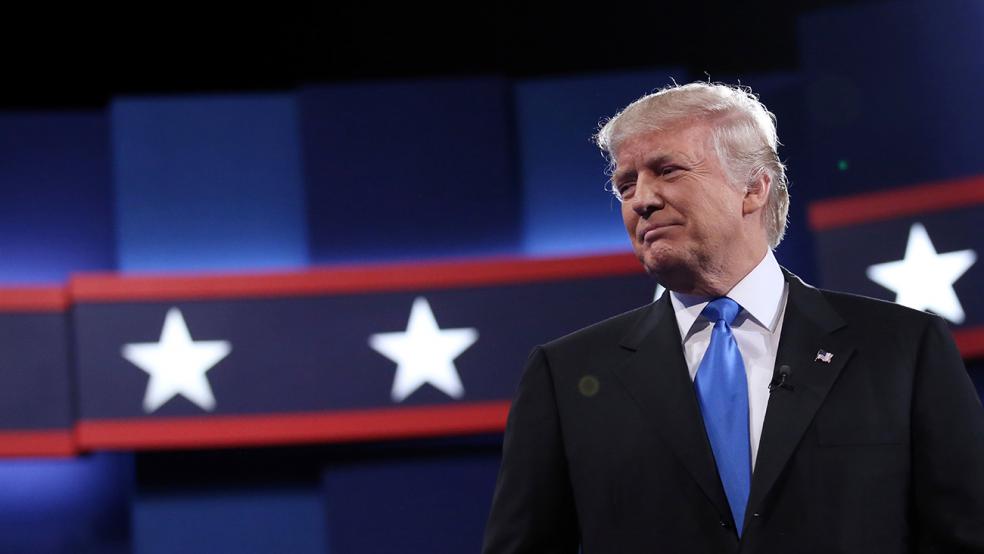The election buzz is electric, but the market’s response hasn’t been quite as charged. Monday night’s debate, billed as the biggest presidential debate of the century and maybe the most watched ever, is contributing to a small bump for stocks.
“What we’re seeing in markets this morning is a small, collective sigh of relief because most commentators, and the few polls that have been released, suggest that Clinton won the debate,” says James Athey of Aberdeen Asset Management.
Related: Trump Was Unprepared and Out of His Depth on Debate Stage
For the economy and the stock market, the outcome of the presidential election on Nov. 8 is the next big catalyst. For months, Clinton's lead in the polls and her mantle as the "status quo" candidate to Trump's predictable nationalism kept investors calm.
That had looked to be changing before the debate. Political observers awakened Monday morning to a batch of new polls that pushed FiveThirtyEight's "Now-cast" electoral map prediction firmly into Trump victory territory, with 55 percent odds. Moreover, an analysis of post-debate swings in the polls found that in eight out of 10 elections since 1976, the non-incumbent party's candidate — in this case Donald Trump — enjoyed a lift.
The pendulum has swung back Clinton’s way, with the Now-cast giving her a 53 percent chance of winning if the election were held today. Of course, it isn’t being held today. We’ve got 41 days to go, and traders in New York and San Francisco haven’t fully woken up to the rise of pro-Trump sentiment in the South and Midwest.
Related: The Most Important Point Clinton Made in Her Debate Against Trump
Depending on whether or how the debate moves the needle, Wall Street may still need to drastically reprice its expectations on what the future holds in areas including monetary policy, energy, health care, trade and immigration. All of this will have an effect on the course of corporate profits and interest rates in 2017 and beyond. Broad market turbulence should result.
Analysts at Societe General have recommended clients prepare for an unexpected Trump win by considering trades that would do well in this scenario: Gold; volatility, via the CBOE Volatility Index and ETFs indexed to it, such as the iPath Short-Term VIX (VXX); and the Japanese yen. These are all considered safe haven trades.
According to Morgan Stanley analysts, before the debate the broader market still wasn't taking the chances of a Trump administration seriously. They noted that "most markets appear to be treating Trump policies as a tail risk" and are vulnerable to a rapid shift should his recent gains in the polls hold. They highlighted declining equity market volatility and steady municipal bonds as evidence of this.
Related: Trump’s Tax Plan Would Benefit the Wealthy Most, Study Finds
The most potent "tail risk" scenario would be a Trump victory combined with Republicans maintaining control of the Senate and the House of Representatives, greatly increasing the chances of actual legislative progress. Morgan Stanley sees two main areas of possible action: Tax reform and trade protectionism.
How will markets price in rising odds that action could be taken on these fronts? The analysts offer two paths.

The first is what they call the "Accidental Stimulus" and refers to the fiscal boost that will be provided by Trump's deficit-raising tax proposals (although the hit could be lessened under "dynamic scoring" calculations that factor in projected economic growth) — something that many economists are actually clamoring for as monetary policy losses efficacy. Why accidental? Because Morgan Stanley doesn't believe Republicans will sell it as an outright stimulus.
The outcome could be a Brexit-type immediate selloff followed by a robust rebound as this fiscal boost to the economy is priced in.
Related: Conservative Economists Mock Trump Campaign’s Trade Proposals
The darker alternative scenario would feature tax reform mixed with actual action on Trump's aggressive protectionist rhetoric, probably through tariffs on imports. This could disrupt trade flows and would "hamper risk taking and heighten uncertainty," according to Morgan Stanley.
The takeaway: Wall Street types are slowly waking up to the fact they've been complacent about this election. Many simply expected a Clinton coronation. As a result, stock market turmoil is likely in the weeks to come as we wind our way to Nov. 8.






